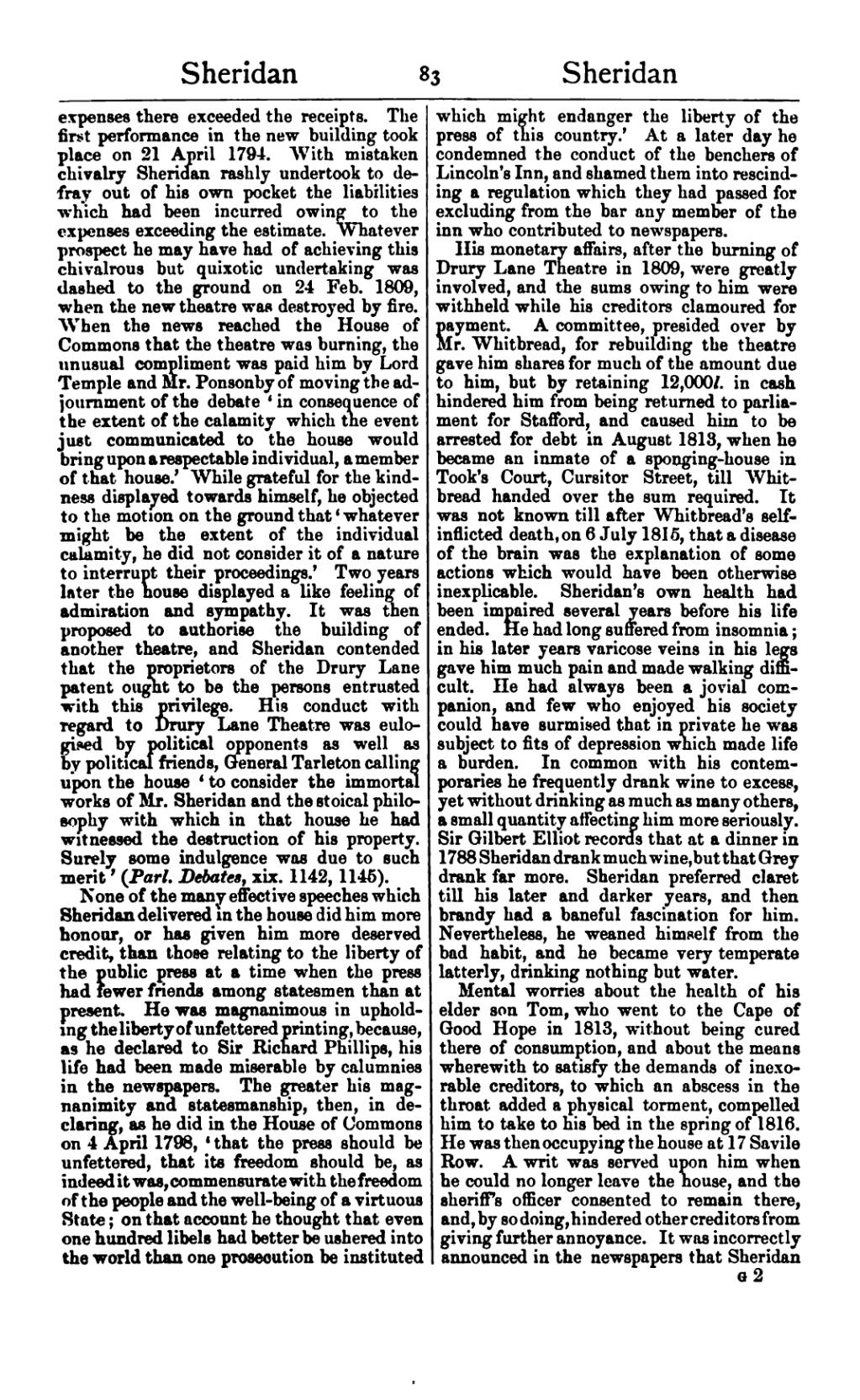expenses there exceeded the receipts. The first performance in the new building took place on 21 April 1794. With mistaken chivalry Sheridan rashly undertook to defray out of his own pocket the liabilities which had been incurred owing to the expenses exceeding the estimate. Whatever prospect he may have had of achieving this chivalrous but quixotic undertaking was dashed to the ground on 24 Feb. 1809, when the new theatre was destroyed by fire. When the news reached the House of Commons that the theatre was burning, the unusual compliment was paid him by Lord Temple and Mr. Ponsonby of moving the adjournment of the debate ‘in consequence of the extent of the calamity which the event just communicated to the house would bring upon a respectable individual, a member of that house.’ While grateful for the kindness displayed towards himself, he objected to the motion on the ground that ‘whatever might be the extent of the individual calamity, he did not consider it of a nature to interrupt their proceedings.’ Two years later the house displayed a like feeling of admiration and sympathy. It was then proposed to authorise the building of another theatre, and Sheridan contended that the proprietors of the Drury Lane patent ought to be the persons entrusted with this privilege. His conduct with regard to Drury Lane Theatre was eulogised by political opponents as well as by political friends, General Tarleton calling upon the house ‘to consider the immortal works of Mr. Sheridan and the stoical philosophy with which in that house he had witnessed the destruction of his property. Surely some indulgence was due to such merit’ (Parl. Debates, xix. 1142, 1145).
None of the many effective speeches which Sheridan delivered in the house did him more honour, or has given him more deserved credit, than those relating to the liberty of the public press at a time when the press had fewer friends among statesmen than at present. He was magnanimous in upholding the liberty of unfettered printing, because, as he declared to Sir Richard Phillips, his life had been made miserable by calumnies in the newspapers. The greater his magnanimity and statesmanship, then, in declaring, as he did in the House of Commons on 4 April 1798, ‘that the press should be unfettered, that its freedom should be, as indeed it was, commensurate with the freedom of the people and the well-being of a virtuous State; on that account he thought that even one hundred libels had better be ushered into the world than one prosecution be instituted which might endanger the liberty of the press of this country.’ At a later day he condemned the conduct of the benchers of Lincoln's Inn, and shamed them into rescinding a regulation which they had passed for excluding from the bar any member of the inn who contributed to newspapers.
His monetary affairs, after the burning of Drury Lane Theatre in 1809, were greatly involved, and the sums owing to him were withheld while his creditors clamoured for payment. A committee, presided over by Mr. Whitbread, for rebuilding the theatre gave him shares for much of the amount due to him, but by retaining 12,000l. in cash hindered him from being returned to parliament for Stafford, and caused him to be arrested for debt in August 1813, when he became an inmate of a sponging-house in Took's Court, Cursitor Street, till Whitbread handed over the sum required. It was not known till after Whitbread's self-inflicted death, on 6 July 1815, that a disease of the brain was the explanation of some actions which would have been otherwise inexplicable. Sheridan's own health had been impaired several years before his life ended. He had long suffered from insomnia; in his later years varicose veins in his legs gave him much pain and made walking difficult. He had always been a jovial companion, and few who enjoyed his society could have surmised that in private he was subject to fits of depression which made life a burden. In common with his contemporaries he frequently drank wine to excess, yet without drinking as much as many others, a small quantity affecting him more seriously. Sir Gilbert Elliot records that at a dinner in 1788 Sheridan drank much wine, but that Grey drank far more. Sheridan preferred claret till his later and darker years, and then brandy had a baneful fascination for him. Nevertheless, he weaned himself from the bad habit, and he became very temperate latterly, drinking nothing but water.
Mental worries about the health of his elder son Tom, who went to the Cape of Good Hope in 1813, without being cured there of consumption, and about the means wherewith to satisfy the demands of inexorable creditors, to which an abscess in the throat added a physical torment, compelled him to take to his bed in the spring of 1816. He was then occupying the house at 17 Savile Row. A writ was served upon him when he could no longer leave the house, and the sheriff's officer consented to remain there, and, by so doing, hindered other creditors from giving further annoyance. It was incorrectly announced in the newspapers that Sheridan
